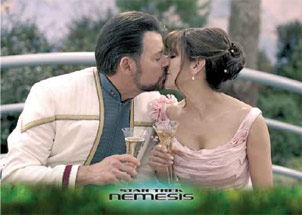I loved Star Trek series, but when The Next Generation came on with its variety of characters and SF verisimilitude, the show stole my heart. They upped the SF game on television for everyone.
When the original Star Trek hit the big screen, it became epic in ways its series could not be. I expected the same for The Next Generation -- not only a burst of SF coolness, but a scale not seen in its series.
But it never happened. Each felt like a double television episode. Fun but missing something vital for the big screen. I exited the theater a little disappointed.
When Nemesis came out, the marriage scene between Commander William Riker and Counselor Deanna Troi made the problem clear. The scene has little tension. Everyone here loves each other and would never accidentally hurt another--except Data whom we can forgive because he's not a living organism. So let's tell a joke at his expense. Ha, ha, ha.
I recently re-watched the ST:TNG movies to puzzle out what went wrong. Nemesis--with its clone antagonist, Shinzon--may be the best. Flaws make people interesting, and the TNG writers shied away from giving the crew flaws, foibles, and conflicts between one another. The original Star Trek movies hit the character flaws head-on. They became an integral part of the story.
Ria Misra tackled "The Underlying Assumption That's Necessary For Every Star Trek Mission" with the astute observation that the crew accepted one another's observations as worthwhile. Now this is cool. However, if you take it too far, you lose dramatic potential.
In fact, we love TNG characters so much that we don't let them suffer or die.
Data is a different story. We can kill him because he's just a machine we adore, but hey, he's got a download so we can start over. His sacrifice matters, sort of, but not as much as if he couldn't return as if he'd never left.
Star Trek killed Spock. Let's say that again: They killed one of the main characters. Sure, he came back, but we didn't know that. They also made Chekov out to be a traitor and Kirk to appear to run away from troubles. The crew locked horns, even if they loved each other Platonically. This makes sense. Who has ever worked at a job where the conflicts didn't occur between boss and employees, employees and employees? Heck, who hasn't lived in a family whose members did not conflict--people who are supposed to love one another?
J.J. Abrams's Star-Trek reboots nailed the drama--within the crew and outside it. However, they rarely capture the camaraderie of the other two series, which as I've suggested before, may be linked to the fact that these characters have not worked with one another extended periods.
I have a working hypothesis that, despite knowing all humanity is flawed, contemporary society fears flaws in people. Flaws mean that someone is a bad guy. Good guys' teeth sparkle, their breath stays minty fresh, their boots never muddy. They always say the right thing. We also fear listening to perspectives that differ from our own, which is strange considering the SF genre is supposed to be all about that.


No comments:
Post a Comment